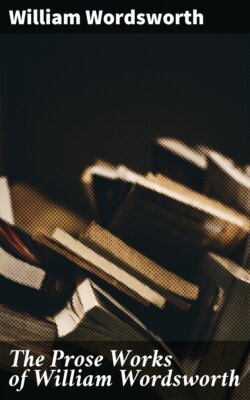Читать книгу The Prose Works of William Wordsworth - William Wordsworth - Страница 25
На сайте Литреса книга снята с продажи.
CRITICAL AND ETHICAL. I. Notes and Illustrations of the Poems, incorporating:
Оглавление(a) The Notes originally added to the first and successive editions. (b) The whole of the I.F. MSS.
This division of the Prose has cost the Editor more labour and thought than any other, from the scattered and hitherto unclassified semi-publication of these Notes. Those called 'original' are from the first and successive editions of the Poems, being found in some and absent in other collections. An endeavour has been made to include everything, even the briefest; for judging by himself, the Editor believes that to the reverent and thoughtful student of WORDSWORTH the slightest thing is of interest; e.g. one turns to the most commonplace book of topography or contemporary verse in any way noticed by him, just because it is WORDSWORTH who has noticed it, while an old ballad, a legend, a bit of rural usage, takes a light of glory from the page in which it is found. Hence as so much diamond-dust or filings of gold the published Notes are here brought together. Added, and far exceeding in quantity and quality alike, it is the privilege of the Editor to print completely and in integrity the I.F. MSS., as written down to the dictation of WORDSWORTH by Miss FENWICK. These have been hitherto given with tantalising and almost provoking fragmentariness in the 'Memoirs' and in the centenary edition of the Poems—again withdrawn in the recent Rossetti edition. In these Notes—many of which in both senses are elaborate and full—are some of the deepest and daintiest-worded things from WORDSWORTH. The I.F. MSS. are delightfully chatty and informal, and ages hence will be treasured and studied in relation to the Poems by the (then) myriad millions of the English-speaking races.
Miss FENWICK, to whom the world is indebted for these MSS., is immortalised in two Sonnets by WORDSWORTH, which surely long ere this ought to have been included in the Poetical Works; and they may fitly reappear here (from the 'Memoirs'):
'On a Portrait of I.F., painted by Margaret Gillies.
We gaze—nor grieve to think that we must die,
But that the precious love this friend hath sown
Within our hearts, the love whose flower hath blown
Bright as if heaven were ever in its eye,
Will pass so soon from human memory;
And not by strangers to our blood alone,
But by our best descendants be unknown,
Unthought of—this may surely claim a sigh.
Yet, blessed Art, we yield not to dejection;
Thou against Time so feelingly dost strive:
Where'er, preserved in this most true reflection,
An image of her soul is kept alive,
Some lingering fragrance of the pure affection,
Whose flower with us will vanish, must survive.
WILLIAM WORDSWORTH.
Rydal Mount, New Year's Day, 1840.'
'To I.F.
The star which comes at close of day to shine
More heavenly bright than when it leads the morn
Is Friendship's emblem, whether the forlorn
She visiteth, or shedding light benign
Through shades that solemnise Life's calm decline,
Doth make the happy happier. This have we
Learnt, Isabel, from thy society,
Which now we too unwillingly resign
Though for brief absence. But farewell! the page
Glimmers before my sight through thankful tears,
Such as start forth, not seldom, to approve
Our truth, when we, old yet unchill'd by age,
Call thee, though known but for a few fleet years,
The heart-affianced sister of our love!
WILLIAM WORDSWORTH.
Rydal Mount, Feb. 1840.'
In addition to these Sonnets the beautiful memory of Miss FENWICK has been reillumined in the 'Memoir and Letters of Sara Coleridge' (2 vols. 1873); e.g. 'I take great delight in Miss Fenwick, and in her conversation. Well should I like to have her constantly in the drawing-room, to come down to and from my little study up-stairs—her mind is such a noble compound of heart and intelligence, of spiritual feeling and moral strength, and the most perfect feminineness. She is intellectual, but—what is a great excellence—never talks for effect, never keeps possession of the floor, as clever women are so apt to do. She converses for the interchange of thought and feeling, no matter how, so she gets at your mind, and lets you into hers. A more generous and a tenderer heart I never knew. I differ from her on many points of religious faith, but on the whole prefer her views to those of most others who differ from her' (ii. 5). Again: 'Miss FENWICK is to me an angel upon earth. Her being near me now has seemed a special providence. God bless her, and spare her to us and her many friends. She is a noble creature, all tenderness and strength. When I first became acquainted with her, I saw at once that her heart was of the very finest, richest quality, and her wisdom and insight are, as ever must be in such a case, exactly correspondent' (ibid. p. 397). Such words from one so penetrative, so indeceivable, so great in the fullest sense as was the daughter of the COLERIDGE, makes every one long to have the same service done for Miss FENWICK as has been done for SARA COLERIDGE and Miss HARE, and within these weeks for Mrs. FLETCHER. Her Diaries and Correspondence would be inestimable to lovers of WORDSWORTH; for few or none got so near to him or entered so magnetically into his thinking. The headings and numberings of the successive Notes—lesser and larger—will guide to the respective Poems and places. The numberings accord with ROSSETTI'S handy one-volume edition of the Poems, but as a rule will offer no difficulty in any. The I.F. MSS. are marked with an asterisk [*]: They are for the first time furnished in their entirety, and accurately.
